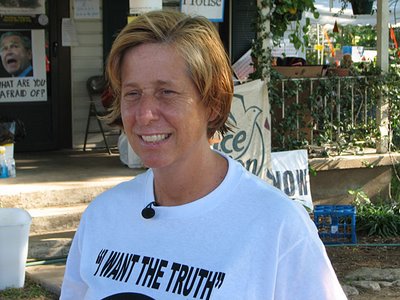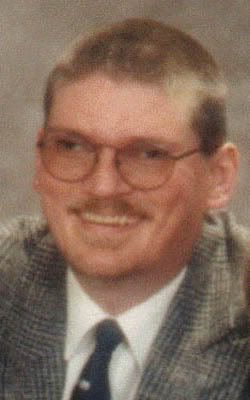SF Gate: Susan Sarandon To Play Cindy Sheehan In Film

Susan Sarandon will play America's Mom, Cindy Sheehan (above) in an upcoming film.
The Defiant War: Cindy Sheehan's Year of Living Famously
San Francisco Chronicle - March 19, 2006
The sun is rising over a house in the Berkeley Hills, and in its modest studio apartment, America's most compelling anti-war activist is making her bed, apologizing for the clutter and running late.
Cindy Sheehan was up much of the previous night while emergency room doctors treated her daughter for a painful cyst, but sleeping in is out of the question. Soon a car will whisk her off to a Canadian TV interview, to be followed by a local TV interview, and finally, fixing spaghetti for her three adult children in Vacaville -- her home before the death of her soldier son Casey and the political trajectory of her anguish propelled her to divorce, to estrangement from friends, and to a frenetic campaign to end U.S. military involvement in Iraq.
And where is "home" to her now?
She pauses and sighs, sinking into the window seat and pulling a quilt up to her chin. "Nowhere, really ... ."
She's averaging just two days per month here. The next morning she will fly off again, the surreal star of what is -- depending largely on one's political perspective -- either an epic tragedy or a farce. After stops for protests in New Orleans and Washington, D.C., she will breakfast in Manhattan with actress Susan Sarandon, who is set to portray her in a biopic movie. A crew will film Sheehan for a weekly reality series on the Sundance Channel. Her letters to President Bush inspired "Peace Mom," a one-woman monologue show in London. A memoir is due to her publisher April 1.
And she hopes to reschedule a trip to address the European Union, postponed, she says, because of injuries when she was arrested yet again and jailed earlier this month on charges of blocking entrance to the U.S. Mission to the United Nations.
A year ago, when The Chronicle's Insight section profiled the Sheehan family, Cindy was a rather anonymous Vacaville mom, shaken by the fact that her son has been killed by an ambush halfway across the globe. Six months later, when she pitched a tent outside President Bush's Texas ranch and demanded he explain the "noble cause" for which Casey was sacrificed, her plaintive cry seized the moment in America. By injecting aching humanity into the political debate, she catalyzed public opinion against the war.
Early during those muggy August days in Crawford -- when Bush balked at meeting with her and instead went biking, saying it was important that he "go on with my life" -- her credibility was at its peak.
It has since fallen, in the eyes of some. Whether that's attributable to the fierce and sometimes false attacks of right-wing media or to her own complicity in over-exposure isn't clear. But by the end of her "Camp Casey" protest, polls showed as many Americans viewed her unfavorably as favorably.
The right set its sights on her, labeling her a leftist dupe and mocking her as, in the words of one headline, "The Grief Pimp." When her husband filed for divorce, the Web site smokinggun.com posted the papers. Conservative scold Ann Coulter wrote: "Call me old-fashioned, but a grief-stricken war mother shouldn't have her own full-time PR flack."
Sheehan's image rose and fell on her willingness to publicize personal pain. A January Vanity Fair spread featured a photo of Cindy Sheehan, eyes closed, lying on her son's grave: National Review columnist Jonah Goldberg suggested it was "the most shameless, exploitative stunt of the decade."
"These plainclothes celebrities become spotlight addicts. The lows of being out of the news cycle make them crave it all over again. So they ratchet up the zealot factor," said Matthew Fell, media director of the Center for Media and Public Affairs. "Cindy Sheehan went from letting her picture be taken, to posing, to mugging. She's become a caricature of herself."
Some people who respected her "Camp Casey" protest have been turned off by what they, too, see as her pushing the envelope. They blanched when she embraced Venezuelan President Hugo Chavez and declared Bush a worse terrorist than Osama bin Laden (she says she addressed the issue of Chavez' own human rights violations privately). She flirted with challenging at the polls California's senior senator, Dianne Feinstein. And talking with Insight last week, she castigated Feinstein and other Democrats who authorized the war as "not 'misled.' I don't buy that. They were war profiteers, plain and simple. Either they were political profiteers or financial profiteers. There's blood on their hands."
Her public rhetoric grows angrier. In the earliest interview, after her first meeting with the president, she gingerly described him as sincere while suggesting he didn't satisfy her about the war. In recent months, she has branded him "The Fuhrer" and a mass murderer, demanding his impeachment. She has squared off against parents who have lost soldiers in Iraq and continue to support the president's policies, labeling them "brainwashed."
Is there not some irony in peace activism that demonizes political opponents -- the sort of lingua franca that, when practiced by governments, leads to wars?
But Cindy Sheehan isn't apologizing for her anger. "How can your rage not increase when every day something comes out that says my son should still be alive, that the reasons for this war are bogus? ... I'm not an extreme wacko -- I'm with the mainstream on this. I don't think it's naive or wacky to be upset that we're still killing people to solve our problems."
In fact, she wishes people to know that she's a nice person. She says that when people meet her, their biggest surprise, other than discovering she stands 6 feet tall, is that she has a great sense of humor.
But even if her life is imbued with a more robust sense of purpose, it wouldn't be surprising if Cindy Sheehan also is a bit adrift.
"Life trauma and sudden fame thrust you into a windstorm, and you're going to be buffeted about, and you need your roots and connections to people who knew you before. Where are those for Cindy Sheehan -- what is her ballast?" asks Harvard psychologist and life coach Carol Kauffman.
Sheehan has been severed from much of her old life -- or she has severed it herself. Her marriage, her job, her home. Loss of most of her friends, whom she cannot forgive for voting to re-elect Bush. Loss of her Catholic faith (a former youth pastor, she has abandoned Christianity and envisions a universal spiritual creator.)
Instead she says she now feels the closest bond to new friends: other anti-war families that have lost someone in Iraq.
"When a child dies before a parent, it throws all of our assumptions about the world into chaos," explains Brian de Vries, professor of gerontology at San Francisco State. "Our children are our own 'immortality projects,' our legacies, our way to make the world better. When some people are robbed of that, they desperately look for another way to better the world."
So rather than retreating into a cloistered hell, these extraordinary parents channel their agony into very public battles. Candy Lightner responded to her teenage daughter's death in a traffic accident by founding MADD (Mothers Against Drunk Driving). Marc Klaas reacted to his daughter Polly's kidnapping and murder by championing tougher sentencing. It's not unusual for such parents to grow alienated from other loved ones grieving differently, nor is it unusual for their motives to be maligned.
As to Cindy Sheehan's motives, it seems almost everyone has their mind made up -- inspiring hero or shameless exploiter -- based solely on her media facsimile. When her daughter Carly, a UC Davis student, began a bartending job, she was taken aback when regulars started trashing her mom.
"I think somebody needs to be out there doing what she's doing to stop the war," Carly says now. "But there are days, you know, when I just want my mom."
Still, they talk by phone daily, and Carly agrees with her mom's observation that her children have grown up in her recent absence. Few can understand what it's like for them. One day actress Jane Fonda, whose anti-war actions during Vietnam have haunted her show-biz career, flew the Sheehan girls to New York for lunch with someone who could understand: her daughter.
Cindy Sheehan, who occasionally has traveled with a bodyguard, tends to dismiss personal criticism by saying "They've taken my son -- what worse could they do to me?
"I don't regret anything I've done. I would do it again in a heartbeat."
She predicts that America will withdraw its forces from Iraq within a year, and rejects the assessment of many experts that a premature pullout will unleash the greater violence of civil war. "What's causing the fighting now," she says, "is our presence."
As she finishes breakfast and readies herself for the day, Sheehan stresses that she would give up fame if she could have her firstborn back. "Why are we talking so much about me?" she says. "What the media should be focusing on is George Bush."
And Carly says: "It's sad that everybody wants to talk about my mom, but nobody even asks about Casey anymore ..."
© 2006 San Francisco Chronicle
All rights reserved. Used with permission.
Source:
The following source was used in the creation of this Kentroversy Paper . . .
The Defiant War - Cindy Sheehan's Year of Living Famously (March 19, 2006)





0 Comments:
Post a Comment
<< Home